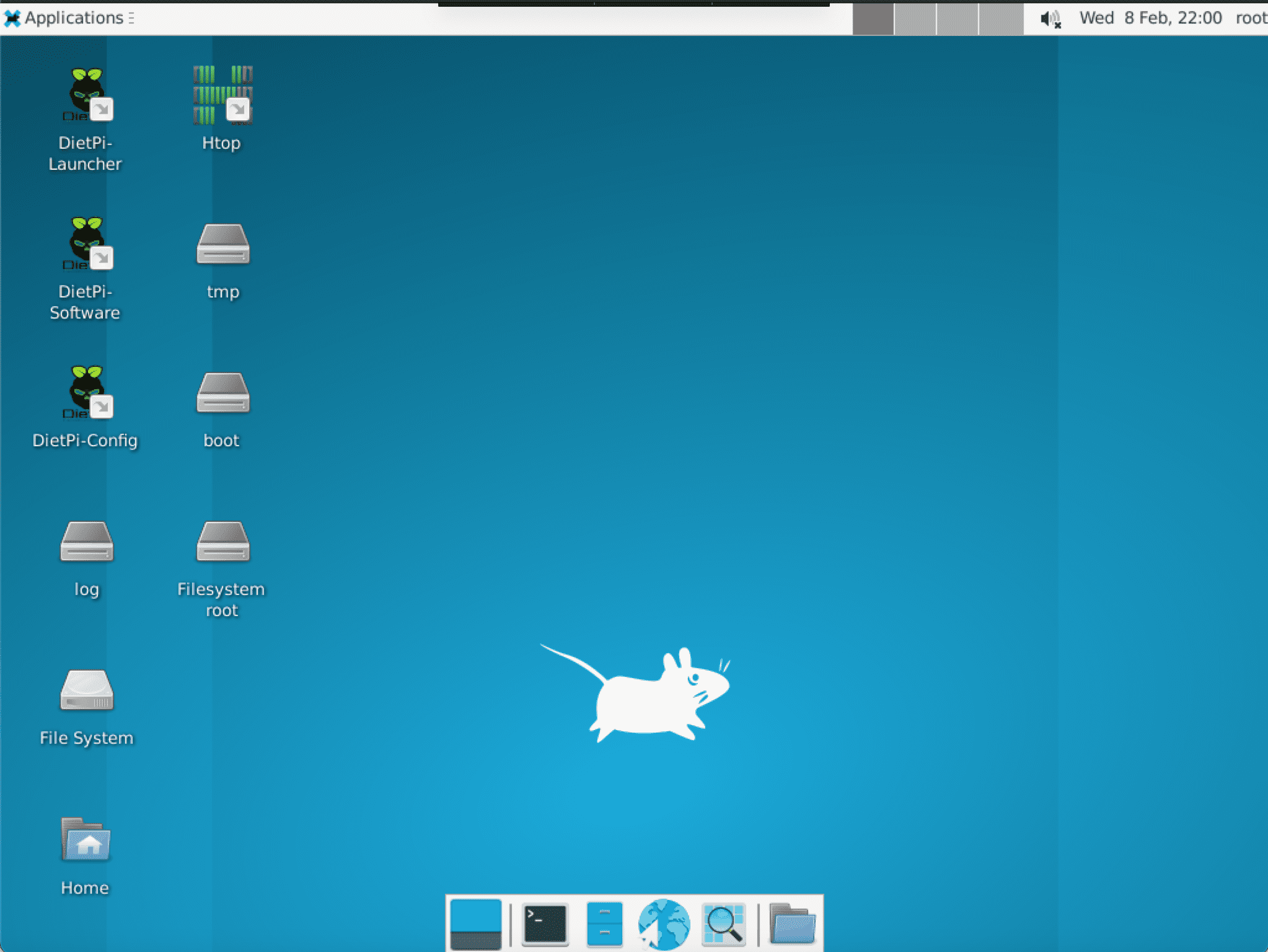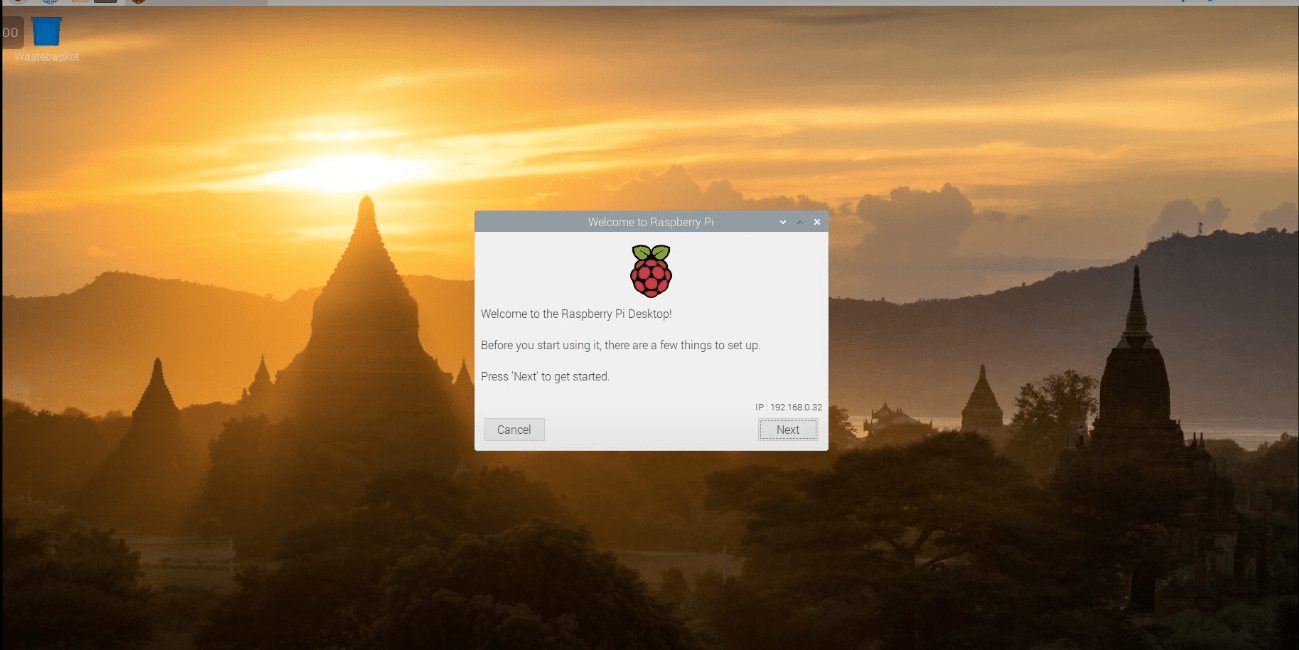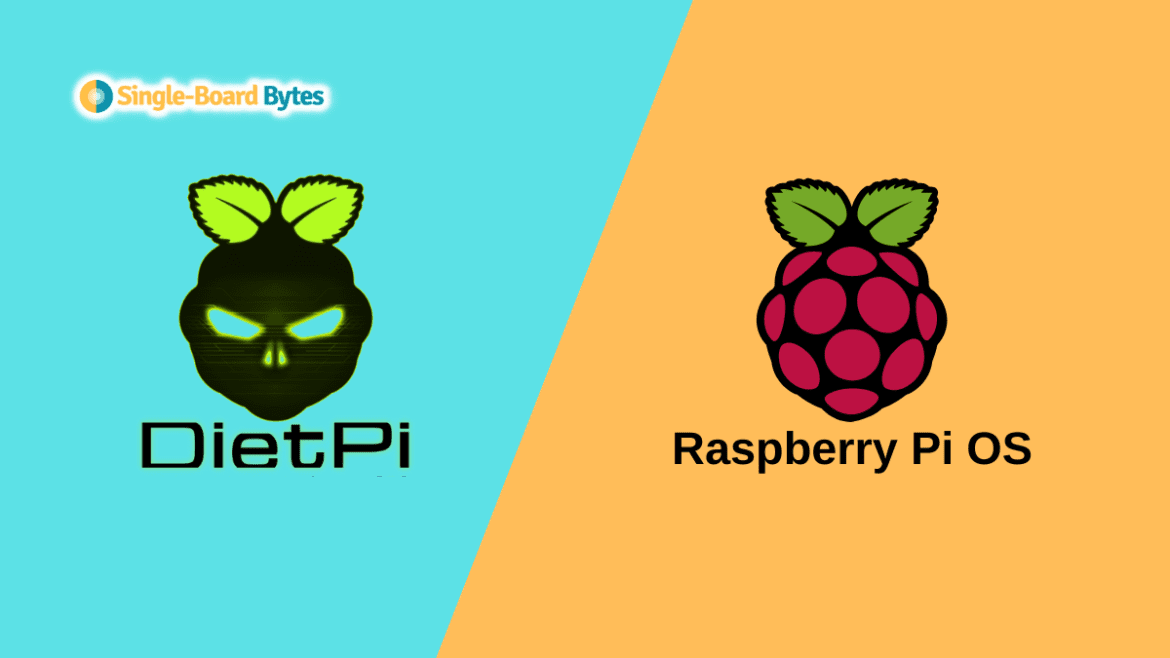Raspberry Pi is a popular single-board computer (SBC) that has gained popularity in recent years due to its versatility and affordability. It has a wide range of applications, from learning programming to building smart homes, IoT devices, and media centers. One of the crucial decisions that Raspberry Pi users have to make is choosing the right operating system.
Raspberry Pi OS (previously known as Raspbian) is the official OS, but there are several alternatives, including DietPi. In this article, we’ll compare DietPi and Raspberry Pi OS and help you choose the better option for your Raspberry Pi.
What is DietPi?

DietPi XFCE Desktop
DietPi is a lightweight operating system designed to run on SBCs like the Raspberry Pi. It is based on Debian, which is known for its stability, security, and massive software repositories. DietPi is known for its simplicity, minimalism, and low system requirements, making it an excellent choice for low-powered devices like the Raspberry Pi. DietPi comes with a wide range of pre-configured software, including SSH, Samba, and Plex media server, making it easy to set up and use.
Main highlights of DietPi
- Lightweight and minimalistic: DietPi is designed to be as lightweight as possible, so it requires very little system resources to run. It has a minimal set of pre-installed packages, which makes it faster and easier to install and set up.
- Easy to use: DietPi comes with an intuitive command-line interface (CLI) that makes it easy to use, even for those who are not experienced with Linux. It also has a web-based graphical user interface (GUI) that makes it easy to manage your system from a web browser.
- Optimized software: DietPi is optimized to run specific software packages, such as media servers, game emulators, or network services. It comes with a variety of optimized software packages that can be easily installed using the CLI or GUI.
- Customizable: DietPi can be customized to meet your specific needs. You can add or remove software packages, configure system settings, and change the appearance of the system to suit your preferences.
- Efficient resource usage: DietPi is designed to use as few system resources as possible, which makes it an excellent choice for low-powered devices such as the Raspberry Pi. It also includes tools for monitoring and optimizing system performance.
- Security-focused: DietPi is designed to be secure by default. It includes features such as automatic updates, firewall configuration, and intrusion detection to help keep your system secure.
As you can see, overall, DietPi is a flexible and efficient operating system that is well-suited for running on single-board computers, especially for specific tasks or applications.
What is Raspberry Pi OS?

Raspberry Pi OS Desktop
Raspberry Pi OS is the official operating system for Raspberry Pi. It is based on Debian, and it is designed to be beginner-friendly, with a graphical user interface and a user-friendly installer. Raspberry Pi OS comes with a range of pre-installed software, including the Chromium web browser, the Thonny Python IDE, and the LibreOffice suite, making it an excellent choice for educational purposes.
Main highlights of Raspberry Pi OS
- Lightweight and optimized: Raspberry Pi OS is optimized to run on Raspberry Pi’s ARM-based processor, which makes it lightweight and fast. It also includes a set of pre-installed software packages that are optimized for the hardware, such as the Chromium web browser and the Thonny Python IDE.
- User-friendly interface: Raspberry Pi OS has a user-friendly graphical user interface (GUI) based on the LXDE desktop environment. It includes a taskbar, start menu, and file manager, making it easy for beginners to use.
- Command-line interface: Raspberry Pi OS also includes a powerful command-line interface (CLI) that provides access to the full range of Linux tools and utilities. This is particularly useful for advanced users and developers.
- Wide range of software packages: Raspberry Pi OS includes a wide range of pre-installed software packages, such as programming tools, office applications, and multimedia software. These packages can be easily installed and managed using the built-in package manager.
- Educational resources: Raspberry Pi OS includes a range of educational resources and programming tools, such as Scratch, Python, and Sonic Pi. These resources are designed to help beginners learn how to program and experiment with the Raspberry Pi.
- GPIO support: Raspberry Pi OS includes support for the Raspberry Pi’s GPIO (General Purpose Input/Output) pins, which allows the computer to interface with external hardware and sensors. This makes it an ideal choice for prototyping and DIY projects.
- Customizable: Raspberry Pi OS is highly customizable, with a range of configuration options and tools available. This allows users to tailor the operating system to their specific needs and preferences.
Overall, Raspberry Pi OS is a versatile and powerful operating system that is well-suited for a wide range of applications, from home automation to robotics and education.
DietPi vs Raspberry Pi OS: Comparison
1. System Requirements
DietPi is designed to be lightweight and minimal, which means it has lower system requirements than Raspberry Pi OS. DietPi can run on a Raspberry Pi with as little as 512MB of RAM, whereas Raspberry Pi OS requires at least 1GB of RAM to run smoothly. This makes DietPi an excellent choice for low-powered devices, including the Raspberry Pi Zero and the Raspberry Pi 1.
2. Pre-Installed Software
DietPi comes with a wide range of pre-configured software, including popular applications like Samba, Plex media server, and OpenVPN. This makes it easy to set up and use, as you don’t have to install and configure the software yourself. Raspberry Pi OS also comes with pre-installed software, including the Chromium web browser, the Thonny Python IDE, and the LibreOffice suite, but it has fewer pre-installed applications than DietPi.
3. Customization
DietPi is highly customizable, and you can install and configure the software according to your needs. DietPi comes with a user-friendly menu system that allows you to install and configure software, tweak system settings, and update the operating system with ease. Raspberry Pi OS is also customizable, but it requires more technical knowledge and effort than DietPi.
4. Stability
DietPi is known for its stability, and it is designed to be lightweight and minimal, which means it has fewer bugs and issues than heavier operating systems. DietPi uses a highly optimized kernel and file system, which helps to improve system performance and reduce the risk of crashes and errors. Raspberry Pi OS is also stable, but it is more prone to crashes and errors than DietPi, especially if you install and use multiple applications.
5. Security
DietPi is designed to be secure, and it comes with several security features built-in, including a firewall, a secure SSH server, and an intrusion detection system. DietPi also comes with a built-in malware scanner, which helps to protect your system from malicious software. Raspberry Pi OS is also secure, but it requires more effort to configure and secure than DietPi.
6. User interface
Raspberry Pi OS has a user-friendly desktop environment and a more complete set of pre-installed software packages. If you’re new to Linux or want a more traditional desktop experience, Raspberry Pi OS may be a better choice.
7. Education and experimentation
Raspberry Pi OS includes a range of educational resources and programming tools, making it a great choice for learning and experimentation. If you’re interested in learning programming or electronics and want to take advantage of the Raspberry Pi’s GPIO pins, Raspberry Pi OS may be a better choice.
Conclusion
Both DietPi and Raspberry Pi OS are excellent choices for your Raspberry Pi, but the better choice depends on your specific needs and use case. If you want a lightweight and minimal operating system that can run on low-powered devices, DietPi is the better choice. DietPi comes with a wide range of pre-installed software, making it easy to set up and use, and it is highly customizable, allowing you to install and configure the software according to your needs.
On the other hand, if you want an operating system that is beginner-friendly and comes with a range of pre-installed software, Raspberry Pi OS is the better choice. Raspberry Pi OS has a graphical user interface and a user-friendly installer, making it easy for beginners to get started. Raspberry Pi OS also comes with a range of pre-installed applications, making it an excellent choice for educational purposes.
